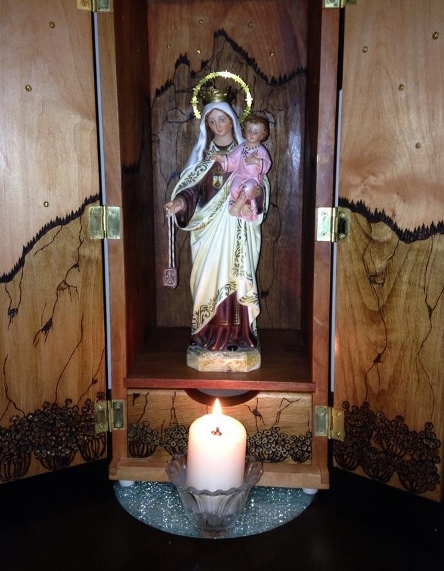The Lay Carmelite is called to live a life of allegiance to Jesus Christ, and does this by sharing in the spirituality of the Carmelite Order. This spirituality is founded on personal and liturgical prayer.
Lay Carmel is a vocation, a way of life, not just something added to life.

Lay Carmelite Formation
Those who meet the following conditions may apply to be members of the Third Order: those who profess the Catholic faith, live in communion with the Church, have good moral conduct, accept the Rule of St. Albert and who desire to live and act in the spirit of Carmel.

Discernment is the art of listening to our inner selves and learning to recognize the voice from the Holy Spirit.
Discernment for the Lay Carmelite involves listening to God's still, small voice. His "call" to us is to imitate Christ by following a Rule of Life established many years ago by the hermits on Mt. Carmel. As we take the first steps by becoming a guest at a community meeting, we begin a process of discerning whether this way of life is for us.
WHAT IS A LAY CARMELITE AND HOW DO I BECOME ONE?
By Natalie Mieras, T.O.Carm., and Margie McCalester, T.O.Carm. (Reprinted by permission of Carmelite Review Magazine)
Do you feel that there is something missing in your life? Do you feel that you might like to be closer to Jesus Christ, walk nearer to him, and be more like Him? Do you feel there is never the correct time to pray, or even just the time to pray? If you answered YES to any of these questions, then perhaps Carmel and the life of a Lay Carmelite is exactly what you are looking for.
ELISABETH LESEUR
Elisabeth Leseur was not a Carmelite, not a religious and is not a canonized saint, so why is she the subject of this article? The answer is that she was a French contemporary of Therese of Lisieux and Elizabeth of the Trinity. She was a married lay woman whose way of life bore a strong similarity to our Third Order Rule. Her example may be of great interest to Lay Carmelites.
Lay Carmelite formation is very much oriented to the study of the lives of saints who were friars, priests or brothers, or sisters or enclosed nuns. A very good reason for choosing them is that we have good records of their lives and their writings, which are so valuable in defining Carmelite spirituality. Lay people, even saintly lay people, have not left us much written material, so we cannot easily use them as our exemplars. Of course, we do have Elijah, the Blessed Virgin Mary, and St. Joseph, the principal protector of our Order, as models, and all of them were lay people, but we do not have anything that they wrote.
The Bible is the Word of God which is always alive and active, always new.
Lectio Divina is a traditional way of praying so that God may penetrate our hearts
and that we may grow in an intimate relationship with the Lord.




